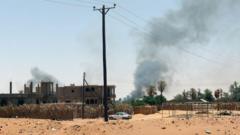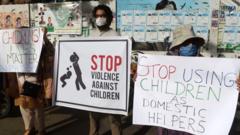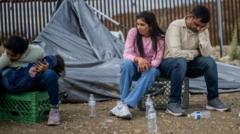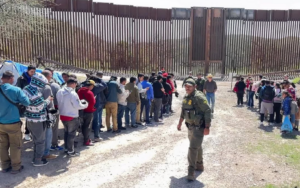The recovery of 28 migrant bodies from a mass grave in Libya underscores the ongoing humanitarian crisis, as the country struggles with human trafficking and violence against migrants.
Mass Grave of Migrants Found in Libya Highlights Ongoing Crisis

Mass Grave of Migrants Found in Libya Highlights Ongoing Crisis
Recent discovery of bodies in Libya sheds light on the dire conditions faced by migrants.
In a tragic development, at least 28 migrant bodies were unearthed from a mass grave in the arid regions of southeastern Libya, according to the nation's attorney general. This grave was located north of Kufra city, occurring shortly after another mass grave containing 19 bodies was identified on a nearby farm. Authorities made this grim discovery following a raid on a trafficking site that liberated 76 migrants who had reportedly endured torture and inhumane treatment during their confinement.
The attorney general’s office reported the arrests of one Libyan national and two foreigners linked to the trafficking operations. Furthermore, they characterized the gang's actions as systematically depriving illegal migrants of their freedom and subjecting them to severe abuses. Social media has been rife with images depicting the recovery efforts, although these have not been verified independently by news outlets.
The search efforts are ongoing in Kufra, which is situated over 1,700 kilometers (approximately 1,056 miles) from the capital, Tripoli. The recovered bodies have been sent for autopsy, with investigators probing potential connections to smuggling networks.
This incident is not isolated; a previous mass grave discovered last year revealed at least 65 migrant bodies in southwestern Libya, an event that was dubbed "deeply shocking" by the International Organization for Migration (IOM). Since the ousting of former leader Muammar Gaddafi in 2011, Libya has evolved into a crucial transit point for migrants attempting perilous journeys across the desert and Mediterranean Sea in hopes of reaching Europe. Alarmingly, UNICEF reported that the number of individuals who either died or went missing in the Mediterranean in 2024 has exceeded 2,200. This crisis is further exacerbated by the ongoing abuses faced by vulnerable populations, including Sudanese women who reportedly suffer sexual violence in Libya.
The attorney general’s office reported the arrests of one Libyan national and two foreigners linked to the trafficking operations. Furthermore, they characterized the gang's actions as systematically depriving illegal migrants of their freedom and subjecting them to severe abuses. Social media has been rife with images depicting the recovery efforts, although these have not been verified independently by news outlets.
The search efforts are ongoing in Kufra, which is situated over 1,700 kilometers (approximately 1,056 miles) from the capital, Tripoli. The recovered bodies have been sent for autopsy, with investigators probing potential connections to smuggling networks.
This incident is not isolated; a previous mass grave discovered last year revealed at least 65 migrant bodies in southwestern Libya, an event that was dubbed "deeply shocking" by the International Organization for Migration (IOM). Since the ousting of former leader Muammar Gaddafi in 2011, Libya has evolved into a crucial transit point for migrants attempting perilous journeys across the desert and Mediterranean Sea in hopes of reaching Europe. Alarmingly, UNICEF reported that the number of individuals who either died or went missing in the Mediterranean in 2024 has exceeded 2,200. This crisis is further exacerbated by the ongoing abuses faced by vulnerable populations, including Sudanese women who reportedly suffer sexual violence in Libya.




















